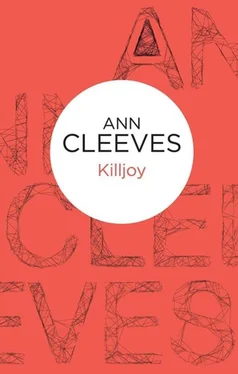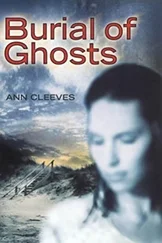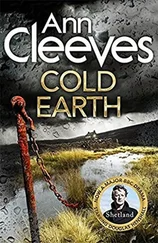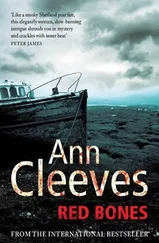Ann Cleeves - Killjoy
Здесь есть возможность читать онлайн «Ann Cleeves - Killjoy» весь текст электронной книги совершенно бесплатно (целиком полную версию без сокращений). В некоторых случаях можно слушать аудио, скачать через торрент в формате fb2 и присутствует краткое содержание. Жанр: Детектив, на английском языке. Описание произведения, (предисловие) а так же отзывы посетителей доступны на портале библиотеки ЛибКат.
- Название:Killjoy
- Автор:
- Жанр:
- Год:неизвестен
- ISBN:нет данных
- Рейтинг книги:5 / 5. Голосов: 1
-
Избранное:Добавить в избранное
- Отзывы:
-
Ваша оценка:
- 100
- 1
- 2
- 3
- 4
- 5
Killjoy: краткое содержание, описание и аннотация
Предлагаем к чтению аннотацию, описание, краткое содержание или предисловие (зависит от того, что написал сам автор книги «Killjoy»). Если вы не нашли необходимую информацию о книге — напишите в комментариях, мы постараемся отыскать её.
Killjoy — читать онлайн бесплатно полную книгу (весь текст) целиком
Ниже представлен текст книги, разбитый по страницам. Система сохранения места последней прочитанной страницы, позволяет с удобством читать онлайн бесплатно книгу «Killjoy», без необходимости каждый раз заново искать на чём Вы остановились. Поставьте закладку, и сможете в любой момент перейти на страницу, на которой закончили чтение.
Интервал:
Закладка:
By now the top of the desk was clear except for a swirling pattern of dust and Ramsay turned his attention to the desk drawers. He was afraid that the top one was locked but it was just stuck and when he lifted it and pulled at the same time it came out altogether. Ramsay set it beside him on the bed. It contained a diary, two sheets of paper, an envelope, and a building society passbook. This must be all that Gabby needed to keep from prying eyes.
The diary was small, of the size to fit in a handbag, and there were none of the teenage outpourings which Ramsay might have expected. In it Gabby noted her appointments, rehearsal times, the dates when essays were due to be handed in. The only inclusion of any interest was an E which appeared at approximately fortnightly intervals. Beside it was a time, usually different. Was E for Ellen, Gabby’s aunt? Ramsay wondered. If so, why the secrecy. Unsatisfied, he moved to the other items in the drawer.
The first sheet of paper was a printed programme for Romeo and Juliet , a Youth Theatre production. Gabby had been playing Juliet. The programme had been autographed by each member of the cast and she had kept it, Ramsay supposed, for sentimental reasons. He noticed briefly that John Powell had played Romeo and wondered if that was Evan’s boy. The second sheet was a lined piece of A4. He would have to check the handwriting but he presumed it was Gabby’s and thought it was the draft of a letter. It was a love letter in which Gabby pleaded to be noticed, to be taken seriously. It was addressed to ‘John’ and Ramsay, whose memory of his own teenage pain was heightened by his meeting with Prue, thought that it had probably never been sent.
The building society account had been opened three months previously with £500 and payments had been made since then to bring the total to almost £800. Ramsay wondered where the money had come from. Her family? A holiday job? The timing of the opening of the account at the end of the summer would suggest that. He would have to check with Prue.
The envelope, which had been at the top of the pile in the drawer, contained no letter. It was cheap and white with Gabby’s name and the Bennett’s address printed in blue ink. It was post-marked the day before her death. Why had she kept it? Ramsay wondered. What had it contained that was so important? And where was the letter that had been inside? He straightened and returned to the warmth of the kitchen.
Anna was there, still in her outdoor jacket, already drinking tea, fending off her mother’s concern about how she was feeling.
‘I’m fine,’ she said. ‘Really. Please don’t fuss.’ But she looked tired and unhappy and had nothing in common with the girl who beamed out at him from the photo on the noticeboard.
‘John Powell,’ Ramsay said. ‘Was he a boyfriend of Gabby’s?’
‘She liked him,’ Anna said. ‘I don’t think they ever went out together.’ She shivered slightly and dipped her head over her mug.
‘She had a letter yesterday,’ Ramsay said. ‘ Who was it from?’
‘How would we know?’ Prue said. She was quite angry. ‘We never read her mail.’
‘She might have told you,’ he said, apologetically. Surely she understood that he was only doing his job. ‘She did have a letter yesterday?’
Prue nodded, only slightly appeased. She stood behind her daughter with her arm round Anna’s shoulder.
‘Did she have a holiday job in the summer vacation?’ he asked.
Anna answered. ‘No,’ she said. ‘We both tried to find work but it was impossible.’
‘She had a building society account with eight hundred pounds in,’ he said. ‘Do you know where she got the money?’
Prue shook her head. ‘ She was always pleading poverty. I kept her on her child benefit. She got a small allowance for pocket money from her family.’
‘So you can’t explain the money in the account?’
‘I’m sorry,’ Prue said firmly. ‘ I wish I could help.’
It was a dismissal and Ramsay left, excluded by the women’s closeness, feeling that he had ruined any chance he might have had with Prue. He went back to Hallowgate police station to talk to Hunter, who had made up his mind already that John Powell was a murderer.
Chapter Eight
Amelia Wood spent the day on the bench at Hallowgate magistrates’ court. She arrived early, feeling cheerful and optimistic but was soon worn down by the atmosphere of the place. She did not enjoy the practical business of being a magistrate. The prestige of being a JP, the training sessions with other professionals, the study of theoretical case histories, the social events, all these she found enjoyable and entertaining. But in the shabby and squalid court, with the smell of damp and urine seeping up from the police cells below she found little to entertain her. The defendants were wretched and inadequate. She did not despise their attempts to improve their financial situation. In their place she would have done the same. But she did despise their incompetence, their half-heartedness, the lack of imagination which prevented their seeing anything through.
The clerk of the court was a well-meaning, rather ineffective young man, who took seriously the Home Office circulars exalting magistrates to consider community based disposals instead of prison. He disliked working with Amelia Wood, whom he found unnecessarily punitive, irrationally arbitrary, but he found confrontation difficult. Stammering and blushing he would interpose at intervals to suggest an alternative sentence. The conflict between them made justice a slow and long-winded affair. There was a long list and the fat solicitors in crumpled suits who sat along the front bench sighed, looked at their watches, and knew that they would miss lunch.
In the afternoon there were two trials. The first concerned a driver with excess alcohol and was over quickly. The second dragged on despite its lack of substance and Amelia Wood found it hard to concentrate. The death of the girl might be an added complication but she did not expect it to make too much difference to her plans.
The defendant who sat in the dock opposite her was middle aged, over-weight, frightened. A few wisps of lank hair had been combed ridiculously across his bare head. He was sweating. He lived on the Starling Farm estate and had been charged with handling stolen property: car radios, which he had been caught selling in several of the Hallowgate pubs. He had remained uncooperative, the police said, throughout questioning. In court the man claimed he had bought the radios legitimately from a car breaker’s yard in Wallsend but was unable to produce any witnesses to back up his story. The prosecutor brought evidence that the radios had been taken from cars stolen in the area. The defence solicitor cross-examined halfheartedly. Amelia listened, her attention wandering, and yawned. At last the trial was over and the magistrates retired to tepid coffee and to consider their decision.
Amelia was prepared to find the man not guilty. It was not that she believed him innocent but it would make things simpler. The case could be over immediately and they would not have to go into a prolonged discussion about sentence. She wanted to be home. Her two colleagues were shocked. They took their position as magistrates seriously. One, a retired bank manager with badly fitting false teeth and body odour, had even taken notes. The sentence of not guilty was out of the question. At a time like this, he said, of disturbance and riot, the courts should be seen to be supporting the police.
‘You’re right, of course,’ said Amelia Wood, graciously. She knew better than to waste energy fighting lost causes. ‘The only question then is what to do with him. I suggest a three-week remand for probation reports. That will give us the opportunity to consider all the options.’
Читать дальшеИнтервал:
Закладка:
Похожие книги на «Killjoy»
Представляем Вашему вниманию похожие книги на «Killjoy» списком для выбора. Мы отобрали схожую по названию и смыслу литературу в надежде предоставить читателям больше вариантов отыскать новые, интересные, ещё непрочитанные произведения.
Обсуждение, отзывы о книге «Killjoy» и просто собственные мнения читателей. Оставьте ваши комментарии, напишите, что Вы думаете о произведении, его смысле или главных героях. Укажите что конкретно понравилось, а что нет, и почему Вы так считаете.












